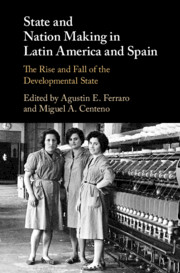Book contents
- State and Nation Making in Latin America and Spain
- State and Nation Making in Latin America and Spain
- Copyright page
- Dedication
- Contents
- Figures
- Tables
- Contributors
- Preface
- Part I Introduction
- Part II Visions and Politics of Development
- Part III Institutional Design: Infrastructural and Territorial Power
- Part IV Industry, Trade, and Growth: Economic Power
- Part V National and Civic Identities: Symbolic Power
- 13 The Developmental State and the Rise of Popular Nationalism: Cause, Coincidence, or Elective Affinity?
- 14 State, Nation, and Identity in Brazil, 1930–1990
- 15 Urban Informality, Citizenship, and the Paradoxes of Development
- Part VI Conclusion
- Index
- References
13 - The Developmental State and the Rise of Popular Nationalism: Cause, Coincidence, or Elective Affinity?
from Part V - National and Civic Identities: Symbolic Power
Published online by Cambridge University Press: 01 December 2018
- State and Nation Making in Latin America and Spain
- State and Nation Making in Latin America and Spain
- Copyright page
- Dedication
- Contents
- Figures
- Tables
- Contributors
- Preface
- Part I Introduction
- Part II Visions and Politics of Development
- Part III Institutional Design: Infrastructural and Territorial Power
- Part IV Industry, Trade, and Growth: Economic Power
- Part V National and Civic Identities: Symbolic Power
- 13 The Developmental State and the Rise of Popular Nationalism: Cause, Coincidence, or Elective Affinity?
- 14 State, Nation, and Identity in Brazil, 1930–1990
- 15 Urban Informality, Citizenship, and the Paradoxes of Development
- Part VI Conclusion
- Index
- References
- Type
- Chapter
- Information
- State and Nation Making in Latin America and SpainThe Rise and Fall of the Developmental State, pp. 317 - 345Publisher: Cambridge University PressPrint publication year: 2018
References
- 2
- Cited by



